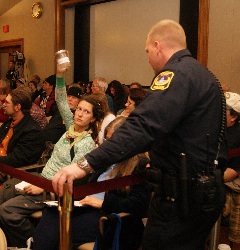Documents obtained by the Center for Media and Democracy, recently unsealed as part of a major lawsuit against Syngenta, reveal that the global chemical company's PR team had a multi-million dollar budget to pay surrogates and others who helped advance its messages about the weed-killer "atrazine." This story is part two of a series about Syngenta's PR campaign to influence the media, potential jurors, potential plaintiffs, farmers, politicians, scientists, and the U.S. Environmental Protection Agency (EPA) in the midst of reviews of the weed-killer's potential to act as an endocrine disruptor.
 These documents reveal a string of money going from Syngenta to pundits, economists, scientists, and others. Below is a sample of some of the "third party" surrogates who have been financially supported by Syngenta.
These documents reveal a string of money going from Syngenta to pundits, economists, scientists, and others. Below is a sample of some of the "third party" surrogates who have been financially supported by Syngenta.
ACSH's Elizabeth Whelan: "A Great Weapon"
Elizabeth Whelan is founder and President of the American Council on Science and Health (ACSH). ACSH is a network of scientists whose stated mission to "ensure that the coverage of health issues is based on scientific facts – not hyperbole, emotion and ideology." Whelan has used hyperbole to advance her agenda, for example, calling the New York Times reporting on atrazine "All the news that's fit to scare."
Some of ACSH's published materials have a disclaimer saying it accepts corporate donations but it "does not accept support from individual corporations for specific research projects." Documents obtained by CMD show (PDF) that Syngenta has been a long-term financial supporter of ACSH and that in the midst of reports about spikes in atrazine levels reported by the New York Times, the Natural Resources Defense Council, and the Huffington Post Investigative Fund, ACSH sought an additional $100,000 to produce more materials about atrazine in addition to seeking increased funding in general by Syngenta.
 One of the few tools for Wisconsin citizens to protect their health and land from the hazards of expanded frac sand mining across the state could be weakened by a newly introduced bill in the state legislature. The state's Senate is considering a piece of legislation today aimed at "limiting the authority" of Wisconsin cities, villages or towns to enact a "development moratorium ordinance" -- a mechanism used recently by several local governments across the state to set aside time so they can investigate the effects of proposed mining on their community.
One of the few tools for Wisconsin citizens to protect their health and land from the hazards of expanded frac sand mining across the state could be weakened by a newly introduced bill in the state legislature. The state's Senate is considering a piece of legislation today aimed at "limiting the authority" of Wisconsin cities, villages or towns to enact a "development moratorium ordinance" -- a mechanism used recently by several local governments across the state to set aside time so they can investigate the effects of proposed mining on their community.
 Wisconsin Governor
Wisconsin Governor  These documents reveal a string of money going from Syngenta to pundits, economists, scientists, and others. Below is a sample of some of the "third party" surrogates who have been financially supported by Syngenta.
These documents reveal a string of money going from Syngenta to pundits, economists, scientists, and others. Below is a sample of some of the "third party" surrogates who have been financially supported by Syngenta. Tucson-based civil rights attorney Stacy Scheff believes that Westin Kierland may have violated federal constitutional law when they threw a journalist (and paid guest) out into the dead of night--due to the simple fact that the journalist evicted had written critically of (and was not liked by) the organization hosting a conference at the hotel. (A new story about these events is available
Tucson-based civil rights attorney Stacy Scheff believes that Westin Kierland may have violated federal constitutional law when they threw a journalist (and paid guest) out into the dead of night--due to the simple fact that the journalist evicted had written critically of (and was not liked by) the organization hosting a conference at the hotel. (A new story about these events is available  Voting is expected on the Regulatory Accountability Act (H.R. 3010) and the Regulatory Flexibility Improvements Act (H.R. 527) on December 1, and on The Regulations from the Executive in Need of Scrutiny (REINS) Act (H.R. 10) next week.
Voting is expected on the Regulatory Accountability Act (H.R. 3010) and the Regulatory Flexibility Improvements Act (H.R. 527) on December 1, and on The Regulations from the Executive in Need of Scrutiny (REINS) Act (H.R. 10) next week.